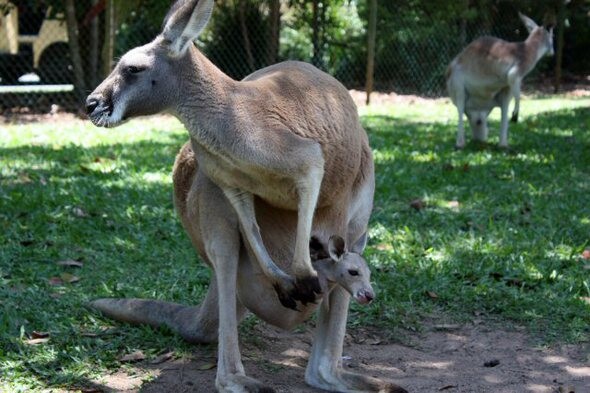hankyoreh
Links to other country sites 다른 나라 사이트 링크
More young Koreans now members of the “Kangaroo tribe”

An increasing number of South Koreans are members of the so-called kangaroo tribe, meaning they have finished their education and are old enough to move out on their own but fail to find jobs and remain financially dependent on their parents. At the same time, 75.1% of parents who are 60 years or above told pollsters that they do not want to live with their children.
This means that, while the job crunch is making it harder for more children to leave the nest, parents want to spend their old age apart from those children.
The results of a survey of South Korean society in 2015 released by Statistics Korea on Nov. 26 show that 31.6% of South Koreans who are at least 60 years of age are living with their children. The most common reason for cohabitation – given by 34.2% of respondents – was that their children were unable to live on their own. This figure is up 4.9 percentage points from two years ago, in 2013, when it was 29.3%.
This suggests that, with jobs harder to get (unemployment among the youth is over 10%) and with few welfare benefits available, young people are waiting longer to become move out.
Another 29.3% of parents were living with their children because they were unable to live on their own. The main reasons for this appear to be the delayed implementation of the national pension plan and other welfare programs, as well as inadequate preparations for retirement taken by people in their 60s and above. Only 56.1% of people who are 60 years or above said that they were preparing for old age.
The poverty rate among South Koreans who are 65 years and above was 48.6%, the highest rate of any country in the OECD.
75.1% of respondents who are 60 years and above said that they would rather not live with their children. The rate was more than 10 percentage points higher than 2009, when it was 62.9%.
The rate of people disinclined to live with their children was higher among men (77.4%) than women (73.3%), and higher in farming and fishing villages (76.1%) than in cities (74.8%).
An overwhelming percentage of the elderly (86%) preferred the idea of living in their own home. Only 13.3% said that they wanted to live in a retirement center or nursing home.
The preferred workplace for people in their teens and twenties was government agencies (23.7%), the survey found. This was followed by state-run enterprises (19.5%) and large corporations (18.7%).
Some notable changes from the survey two years ago were that the preference for government agencies had dropped 5 percentage points while the preference for self-employment had risen from 8.5% to 11.5%.
61% of people with jobs reported feeling anxious on a regular basis about losing their jobs or being forced to find a new one. 16.4% of respondents even described their anxiety as “very severe.”
When asked about the biggest obstacle to women finding work, the most common response was the burden of child care (47.5%), while 21.5% of respondents pointed to customs and stereotypes about women in society.
By Kim So-youn, staff reporter
Please direct questions or comments to [english@hani.co.kr]

Editorial・opinion
![[Editorial] Does Yoon think the Korean public is wrong? [Editorial] Does Yoon think the Korean public is wrong?](https://flexible.img.hani.co.kr/flexible/normal/500/300/imgdb/original/2024/0417/8517133419684774.jpg) [Editorial] Does Yoon think the Korean public is wrong?
[Editorial] Does Yoon think the Korean public is wrong?![[Editorial] As it bolsters its alliance with US, Japan must be accountable for past [Editorial] As it bolsters its alliance with US, Japan must be accountable for past](https://flexible.img.hani.co.kr/flexible/normal/500/300/imgdb/original/2024/0417/6817133413968321.jpg) [Editorial] As it bolsters its alliance with US, Japan must be accountable for past
[Editorial] As it bolsters its alliance with US, Japan must be accountable for past- [Guest essay] Amending the Constitution is Yoon’s key to leaving office in public’s good graces
- [Editorial] 10 years on, lessons of Sewol tragedy must never be forgotten
- [Column] A death blow to Korea’s prosecutor politics
- [Correspondent’s column] The US and the end of Japanese pacifism
- [Guest essay] How Korea turned its trainee doctors into monsters
- [Guest essay] As someone who helped forge Seoul-Moscow ties, their status today troubles me
- [Editorial] Koreans sent a loud and clear message to Yoon
- [Column] In Korea’s midterm elections, it’s time for accountability
Most viewed articles
- 1Samsung barricades office as unionized workers strike for better conditions
- 2[Column] The clock is ticking for Korea’s first lady
- 3[Editorial] When the choice is kids or career, Korea will never overcome birth rate woes
- 4Why Israel isn’t hitting Iran with immediate retaliation
- 5[News analysis] After elections, prosecutorial reform will likely make legislative agenda
- 6S. Korea, Japan reaffirm commitment to strengthening trilateral ties with US
- 7Japan officially says compensation of Korean forced laborers isn’t its responsibility
- 8[Editorial] As it bolsters its alliance with US, Japan must be accountable for past
- 9[Editorial] Does Yoon think the Korean public is wrong?
- 10[Guest essay] How Korea turned its trainee doctors into monsters